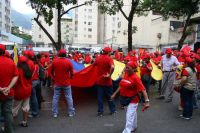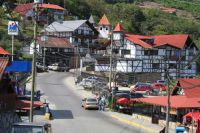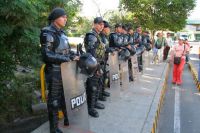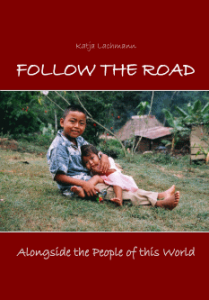Venezuela vs. Colombia
Originally written for CoolWorks.com
What makes the difference for a hitch-hiker traveling through these countries? We tried to find it out, and were actually surprised to see what Venezuela and Colombia really are about.
The first days in Venezuela brought us a quite confused view to the current situation in this wanna-be socialistic country. It is as if East meets West concerning ideals, a confrontation on many sides. There is Hugo Chavez, the president of Venezuela, talking for 8 hours non-stop on television channels about his revolution, thousands of red-dressed supporters marching in order to promote Chavez ideals. On one side you can see happy people, thanking Chavez for his generousness. On the other side – businessmen who are having hard time, as they lost everything through the change of political situation. Chavez is everywhere – on t-shirts, huge posters in the roads, tv, radio… There is a play of power, of strong idealism, a spark of hope, but at the same time a big black hole in which the country could fall. That was our impression.
Traveling through Venezuela by hitch-hiking was not the most pleasant we have experienced. People picked us up in average in less than an hour. They were concerned about us. We were told stories about drugs, robberies, and killings. The only provinces of Venezuela we were recommended as safe were Monagas and Merida. We received warnings from nearly every driver we have met. We often felt uncomfortable in the country, but nonetheless continued hitch-hiking. We were fed sometimes, but invitations into houses were rare. Every driver we met knew to talk about politics. We were drawn into the problems of political change. We got to know too many pros and cons, which left us even more confused. Contact to locals besides the ones giving us a ride was difficult to establish.
Venezuela is a beautiful country, which has got everything: mountains, beaches, farms in the lowlands, jungle, even German villages, and Lithuanians born and raised in Venezuela. Venezuela is a mixture of cultures coming from all over the world. Many are descendents of European immigrants, which escaped the chaos after the World War II.
Crossing the Colombian border was not easy. We came at the “right time” during demonstrations on the border. The introduction of road fees for each car crossing the border on Colombian side caused people to protest and block the roads. Border-crossing was for few hours open and then blocked again. When we finally managed to cross, we found ourselves near another blockade, just set up while we were passing the bridge connecting the countries. We got alarmed when suddenly 12 “robocops” (special police forces) approached us. “Go fast!”, Augustas was telling me. We were about to get into a riot, but we escaped on time. Our helpers, the robocops, cleaned the area…
‘Hitch-hiking in Colombia is impossible’ was the warning we received from several Venezuelans. Despite that we believed that hitch-hiking will work. Our first ride in Colombia we got pretty fast. Hitch-hiking in Colombia turned out to be enjoyable. Everybody around us was so nice, so helpful: sellers of drinks in the toll-gates would give us water, policemen would arrange rides for us, and truck drivers would risk to pay a fine for transporting us. Many times we would be invited for a nice meal, paid for rides in taxis and buses, and invited to people’s houses. When we needed a place to sleep people usually cared about us. They did not just leave us anywhere. They evaluated themselves what was save enough, often drove us many more kilometers than intended, and we were always asked “Do you need anything?”
Because of guerillas hiding in forests and mountains, which live from the production of narcotics, safety in Colombia for many years was a big issue for travellers and locals. Good news are, that the current president Alvaro Uribe Velez, since he took power 5 years ago, managed to push guerillas away from the main roads by placing military forces every 10-20 kilometers. People now are more relaxed and feel safer.
Both countries, Venezuela and Colombia, have their pleasantries. In general we felt unsafe in Venezuela, and safe in Colombia. Colombia and Panama are until now the most amazing countries we have visited. Both nations have the most generous people we have met so far.







Comments
Leave a comment